Jump-starting a riding lawn mower battery video
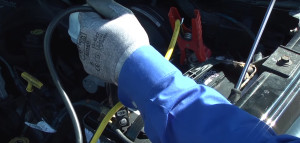

If the battery in your riding lawn mower is unexpectedly dead, you may need to use jumper cables to get it going. Batteries can be dangerous if you handle them incorrectly, so this video shows you how to jump-start your mower’s battery safely so you can get back to mowing.
For additional repair help, including common symptoms and troubleshooting tips, step-by-step riding mower and tractor repair guides and articles, check out our repair help section. In addition, find the riding mower parts you need to fix your mower.
Supplies you may need
Jumper cables
Safety glasses
Work gloves
When to jump-start a battery
Hi, Wayne here from Sears PartsDirect. Today we're going to talk about jump-starting your riding lawn mower—safely. Ideally, you should use a battery charger to charge your riding mower battery, because repeatedly jumping the battery can eventually damage the charging system.
It’s okay to jump-start a riding mower battery every once in a while—if the riding mower uses a 12-volt battery. If it uses a 6-volt battery, you’ll have to use a battery charger. Check your owner's manual if you're unsure of your mower's battery voltage.
Batteries are inherently dangerous because they contain acid and generate explosive gasses. That’s why you should use eye protection and wear work gloves when jump-starting your battery. Don't lean directly over a battery when connecting the cables either.
Keep sparks and flames clear of the batteries, and don't smoke near a battery. One more rule: Use an automobile to jump-start a riding mower. Don't use another riding mower, because you could damage electrical systems in the other mower.
How to connect cables to a battery
Now let’s get started. Park the riding mower on a level surface and set the parking brake. Follow the instructions in your owner's manual to prepare the mower for starting. On many mowers, you shut off the blades before starting the engine.
Park the vehicle next to your riding mower and shut off the vehicle’s engine. Never jump a riding mower from a running engine. Open the vehicle's hood and lift the riding mower seat to access both batteries. Now you’re ready to connect the jumper cables in the right order to avoid damaging the good battery in your vehicle. First, connect one end of the red jumper cable to the positive terminal on the mower battery. Connect the other end of the red cable to the vehicle's positive battery terminal. Don't let the other end of the red cable touch any metal. You'll see a lot of sparks and could damage the good battery.
Next, connect the black jumper cable to the vehicle's negative battery terminal. Then connect the other end of the black jumper cable to the metal mower frame away from the fuel tank and battery. Turn the ignition key and start the mower engine.
How to disconnect the cables
Now disconnect the jumper cables—in the right order. Disconnect the black cable from the mower frame first and then disconnect the black cable from the vehicle's battery. Next, disconnect the red cable from the vehicle's battery and then disconnect the red cable from the mower's battery.
Fully charge the mower battery as soon as possible by connecting the battery to a charger. If the battery won't charge, replace it. I hope this video helped you out today. Check out our other videos here on the Sears PartsDirect YouTube channel. Subscribe, and we’ll let you know when we post new ones.
Most common symptoms to help you fix your riding mowers & tractors
Choose a symptom to see related riding mower and lawn tractor repairs.
Main causes: faulty battery, bad alternator…
Main causes: damaged cutting blade, worn deck pulley, damaged mandrel pulley, loose fasteners on mower deck components…
Main causes: damaged tie rods, bent or worn wheel spindle, worn front axle, damaged sector gear assembly…
Main causes: worn or broken blade belt, broken belt idler pulley, blade clutch cable failure, bad PTO switch, damaged ma…
Main causes: punctured tire or inner tube, leaky valve stem, damaged wheel rim…
Main causes: engine overfilled with oil, leaky head gasket or sump gasket, damaged carburetor seals, cracked fuel pump, …
Main causes: clogged carburetor, damaged flywheel key, dirty spark plug, stale fuel, improper valve lash, engine needs a…
Main causes: shift lever needs adjustment, neutral control needs adjustment…
Main causes: worn or broken ground drive belt, bad seat switch, transaxle freewheel control engaged, transaxle failure, …
Most common repair guides to help fix your riding mowers & tractors
These step-by-step repair guides will help you safely fix what’s broken on your riding mower or lawn tractor.
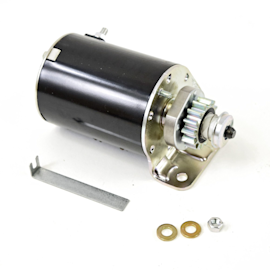
How to replace the starter motor on a riding lawn mower
If you hear the solenoid click but don’t hear the starter motor spin when you turn the key, follow these steps to replac…
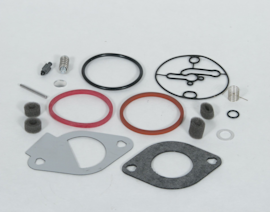
How to rebuild a riding lawn mower carburetor
Get your sputtering carburetor running smoothly in 60 minutes.…
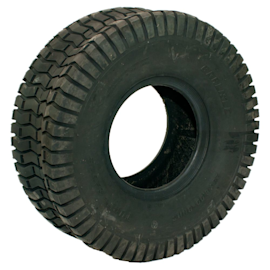
How to replace a riding lawn mower rear tire
Your mower can’t run on a damaged rear tire. Here’s how to install a new one.…
Effective articles & videos to help repair your riding mowers & tractors
Use the advice and tips in these articles and videos to get the most out of your riding mower or lawn tractor.

Learn about all the convenient features on our Sears PartsDirect website that make your parts purchases easier.…
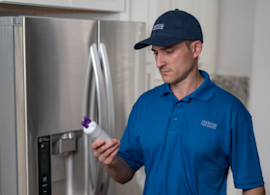
Get answers to frequently asked questions about Sears and Sears PartsDirect.…
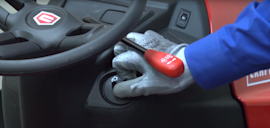
Check the starter solenoid, starter motor, wiring, battery and engine.…